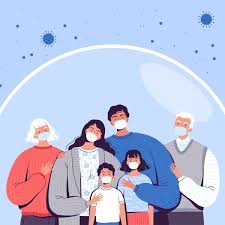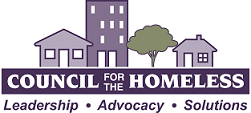By Morgan Valentine, Council for the Homeless
 The COVID-19 pandemic has redefined life for the nation, with masks and six feet of physical distancing having become the norm. The Centers for Disease Control and Prevention recommends a period of self-quarantine and isolation for those who have come into contact with COVID-19, either through testing positive themselves, or through close contact with another. During this period, people will follow “stay at home” guidance. But during the time of COVID-19, where do households go for quarantine or isolation if they don’t have a house? Where could folks experiencing homelessness go to rest and recover from having COVID-19? How could they go about getting their basic needs, such as food and medications still met in a “contactless” format? For a while, households experiencing homelessness could be referred to a quarantine and isolation site that was operated here in Clark County at a Motel 6. This site provided single room occupancy space for households experiencing homelessness who needed to isolate due to close contact with someone who had COVID-19, or who needed to quarantine and recover while infected with COVID-19. This service operated from April 2020 to December 2020. When the operating agency could no longer provide quarantine and isolation space for folks experiencing homelessness at the Motel 6 back in December, the program was scheduled to shut down and it was uncertain if folks experiencing homelessness would be able to go elsewhere to safely quarantine and isolate indoors.
The COVID-19 pandemic has redefined life for the nation, with masks and six feet of physical distancing having become the norm. The Centers for Disease Control and Prevention recommends a period of self-quarantine and isolation for those who have come into contact with COVID-19, either through testing positive themselves, or through close contact with another. During this period, people will follow “stay at home” guidance. But during the time of COVID-19, where do households go for quarantine or isolation if they don’t have a house? Where could folks experiencing homelessness go to rest and recover from having COVID-19? How could they go about getting their basic needs, such as food and medications still met in a “contactless” format? For a while, households experiencing homelessness could be referred to a quarantine and isolation site that was operated here in Clark County at a Motel 6. This site provided single room occupancy space for households experiencing homelessness who needed to isolate due to close contact with someone who had COVID-19, or who needed to quarantine and recover while infected with COVID-19. This service operated from April 2020 to December 2020. When the operating agency could no longer provide quarantine and isolation space for folks experiencing homelessness at the Motel 6 back in December, the program was scheduled to shut down and it was uncertain if folks experiencing homelessness would be able to go elsewhere to safely quarantine and isolate indoors.
Council for the Homeless took leadership of this critical service and stepped in to continue the program via expanded operations. A remote team was established, and new relationships were developed with different motels, professional cleaners, laundromats, other non-profits, and transporters—no small task when informing potential stakeholders at the start that all of these services would be utilized by folks confirmed positive for, or at risk of COVID-19. In making sure that Council for the Homeless communicates and sells the Quarantine and Isolation program transparently to community partners, this has allowed for more programmatic consistency and messaging, where the community can understand clearly what to expect and how services are coordinated.
Now operated at multiple remote motels with extended supports, referrals are sent to Council for the Homeless from health care providers, outreach workers, inpatient facilities, and shelter providers on behalf of households experiencing homelessness who need to quarantine or isolate. From there, folks are transported directly to the quarantine/isolation motel. Quarantine and isolation can be an emotionally and mentally trying process, especially for our neighbors experiencing homelessness who may not have as convenient an access to mainstream services or supports. During the course of their stay, households in quarantine/isolation are dropped off daily meals and hygiene items, receive daily health guidance and check-ins from Clark County Public Health, and maintain regular communication with a dedicated staff member should any specific needs arise that would inhibit or make more difficult an already taxing quarantine process.
Although Council for the Homeless is the lead on this program, we work closely with phenomenal partners who ensure this program flows smoothly. Our motel partners have shown ongoing hospitality and have welcomed the opportunity to serve and provide temporary housing for our neighbors experiencing homelessness. Share has been serving daily meals and snacks for over 80 rotating quarantine and isolation households. Radio Cab has been providing transportation to and from the various motel sites for our neighbors, as well as assisting with medication needs that arise and visits to urgent health care. Our partners at Servpro Vancouver make sure that each motel room is fully cleaned, sanitized, and ready to rent out to the next household in need of quarantine and isolation.
The stigma of homelessness and COVID-19 continues to be a prevailing mindset in society. Whether we are supporting clients in quarantine and isolation, during severe weather, or placing them in emergency shelters or permanent housing, we are steadfast in our belief that housing is a human right, and housing is healthcare.
